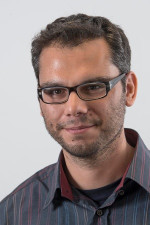| Evangelos Vlachos |
| Thu 05 Apr 2018, 13:00 - 14:00 |
| AGB Seminar Room AGB Building, King’s Buildings, EH9 3JL |
If you have a question about this talk, please contact: Ardimas Purwita (s1600157)

Evangelos Vlachos is a post-doctoral researcher in the Institute for Digital Communications (IDCOM), University of Edinburgh.
Abstract:
We consider the challenging problem of channel estimation at the receiver of a massive multiple-input multiple-output system with hybrid analog/digital beamforming and low-resolution quantization. We propose a dithered beamforming architecture, where random control signals are injected to the analog part of the receiver beamformer and to the analog-to-digital converters to introduce randomness into the signal capturing process and combat the stair-case quantization effects. The statistical properties of the dithered output are captured via an Expectation-Maximization approximation of the maximum a-posteriori estimator. A low-complexity algorithm is proposed which exhibits performance close to the oracle-based least-squares estimation of the sparse channel.
Biography:
Evangelos Vlachos received the Diploma degree in Computer Engineering and Informatics, the MSc degree in Signal Processing and Telecommunications and the Ph.D. degree in Signal Processing for Wireless Communications from University of Patras (UoP), Greece, in in 2005, 2009 and 2015, respectively. From 2015 to 2016 was a post-doctoral researcher at Laboratory of Signal Processing and Telecommunications in Computer Engeneering and Informatics, UoP, Greece working on distributed signal processing over networks. During 2016 worked as a post-doctoral researcher at Visualization and Virtual Reality Group, UoP on graph signal processing and received best paper award from IEEE ICME2017. Since 2017, he is a post-doctoral researcher in signal processing for communications currently working at the Institute for Digital Communications (IDCOM), University of Edinburgh. His current focus is on the next-generation 5G wireless networks, developing efficient low-power and low-complexity techniques, suitable for the future millimetre wave massive MIMO systems.


